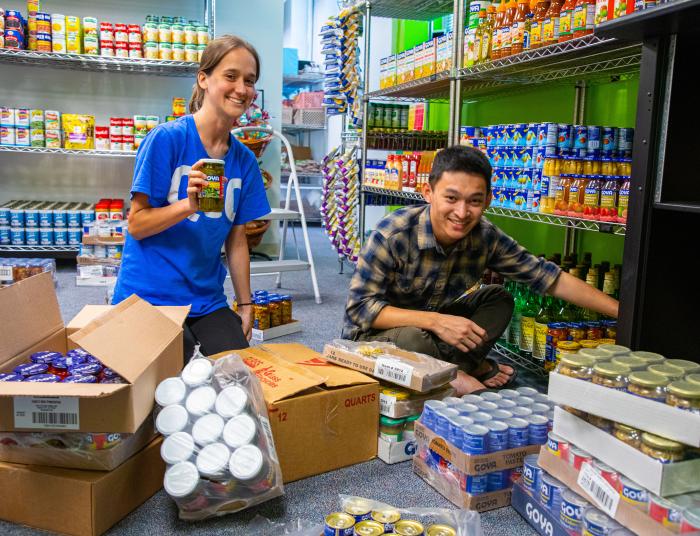Figure out How Food Pantry Lockhart is Making a Difference Locally
Figure out How Food Pantry Lockhart is Making a Difference Locally
Blog Article
Why Sustaining Your Local Food Kitchen Is Important for Aiding Those in Demand
The value of supporting regional food pantries can not be overstated, especially in the context of food insecurity, which affects an alarming number of people and family members within our neighborhoods. As we explore the complex role of food cupboards, it becomes apparent that their impact prolongs much past merely distributing food.
Recognizing Food Insecurity
Food insecurity impacts approximately 10.5% of houses in the United States, illustrating a significant public health issue that goes beyond simple appetite. It describes the absence of regular accessibility to adequate food for an energetic, healthy life. This condition can result in an array of unfavorable outcomes, consisting of poor wellness, enhanced medical care expenses, and decreased academic efficiency among children.
The root causes of food instability are complex, usually stemming from financial factors such as underemployment, poverty, and unemployment. Geographical location can also play a vital role, with food deserts-- locations with limited access to healthy and inexpensive food-- aggravating the concern - Food Pantry Lockhart. In addition, systemic variables, consisting of social and racial injustices, add to the out of proportion influence of food instability on marginalized communities
Attending to food insecurity is not just regarding raising food supply; it requires a detailed strategy that includes financial stability, education, and neighborhood support. Food insecurity not just influences private wellness however additionally has broader implications for societal wellness and performance. Understanding its complexity is important for developing efficient treatments and promoting lasting services that guarantee all people have reliable accessibility to nourishing food.
The Function of Food Pantries
Neighborhood food kitchens serve as essential lifelines for individuals and family members facing food instability. They provide crucial food items to those who may have a hard time to afford adequate nourishment as a result of economic hardship, unemployment, or unforeseen scenarios. By distributing food at no price, these organizations help alleviate cravings and avoid the unfavorable wellness influences connected with insufficient diet plans.
Food kitchens often partner with regional ranches, food store, and area companies to source a range of nourishing food items, including fresh fruit and vegetables, milk, and proteins. This collaboration makes sure that cupboard customers obtain not only nutrition but additionally healthier choices that add to overall health.
Moreover, food kitchens function as area hubs, fostering connections amongst residents and giving a feeling of dignity to those in requirement. Several cupboards offer extra resources, such as nourishment education and learning and references to social solutions, assisting clients navigate their challenges better.
Essentially, food cupboards play a complex duty in combating food instability. They not just address prompt cravings yet additionally equip individuals and family members to boost their scenarios, consequently promoting neighborhood durability and cohesion.

Advantages of Supporting Food Pantries

Sustaining food kitchens not just nurtures those in demand but additionally strengthens the fabric of the community. By providing crucial food resources, food pantries reduce appetite and reduce food insecurity, which is critical for the health and wellness of family members and people. Access to nutritious food adds to boosted physical health and wellness, much better instructional outcomes for youngsters, and boosted psychological wellness, thereby promoting a more effective and involved neighborhood.
Moreover, supporting food cupboards advertises social communication. These organizations act as centers for area engagement, bringing together volunteers, donors, and receivers in a shared objective to combat hunger. This collaboration can break down barriers, foster understanding, and develop connections among varied neighborhood participants.
Furthermore, donations to food pantries, whether in the form of food, funds, or time, stimulate the neighborhood economic situation. Lots of food kitchens focus on sourcing from regional producers, therefore supporting neighborhood agriculture and businesses. This produces a cycle of find more assistance that benefits not just those in requirement however the community in its entirety.
Just How to Obtain Included
Interaction with food kitchens can take many types, allowing individuals and teams to make a purposeful effect in their communities. One of one of the most direct means to obtain entailed is by contributing food items. Non-perishable products such as canned products, pasta, and rice are always in need. Monetary donations are likewise invaluable, as they allow food pantries to buy fresh produce and crucial products.
Volunteering your time is an additional impactful way to support neighborhood food kitchens (Food Pantry Lockhart). In addition, take into consideration arranging food drives within your neighborhood, office, or college group to elevate recognition and collect resources.
Collaborations with neighborhood services can better boost support for food pantries. Organizations can hold contribution occasions or add a section of their sales to the kitchen. Lastly, getting the word out via personal networks more and social media aids to boost exposure and encourage others to contribute. By taking these groups, individuals and steps can significantly strengthen the initiatives of regional food kitchens and help those in requirement.
Community Influence and Connection
Identifying the extensive influence of food kitchens on community wellness is crucial for promoting a spirit of link and collaboration. Food pantries offer not only as vital resources for those dealing with food instability but additionally as centers for neighborhood involvement. They combine varied groups-- customers, volunteers, and donors-- creating an atmosphere where people can link and sustain each other.
The impact of food cupboards prolongs beyond mere provision of food; they act as a catalyst for social cohesion. By taking part in kitchen efforts, area participants can create partnerships that go beyond socioeconomic barriers. This network of assistance aids to dismantle the preconception often connected with food aid, cultivating an ambience of approval and understanding.
As people join in their efforts to sustain regional food kitchens, they cultivate a feeling of common purpose and duty, reinforcing the concept that everyone has a role to play in ensuring that no one goes hungry. Eventually, sustaining food pantries strengthens the textile of the neighborhood as a whole.
Verdict
Sustaining regional food cupboards is crucial in combating food insecurity and boosting the click now health of at risk populations. By ensuring accessibility to healthy food, these organizations contribute to improved health results, educational performance, and mental wellness. Interaction with food cupboards fosters community connections, promoting social cohesion and equity. Inevitably, the collective initiative to boost these essential sources plays a significant duty in building a healthier, much more durable culture where all people have the possibility to prosper.

Report this page